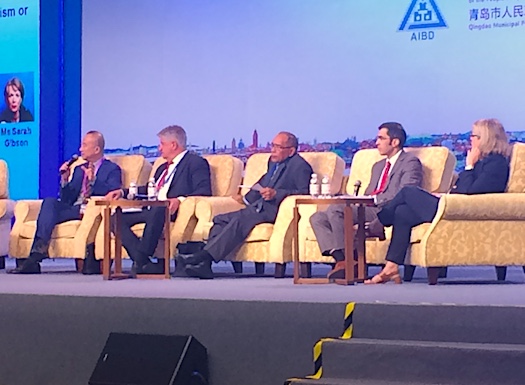These days truth in reporting is a big issue.
The topic was tackled in a session discussing quality reporting at this year's Asia media Summit.
What is truth? asked Chinese broadcaster Han Bin in the session about journalism in the modern media environment.
The question sparked a lively discussion by a range of panellists from the world’s leading broadcasters.
“Western Countries have a perspective. So do we, in China it is a balance between government and the people.”
Finding truth is not as challenging as how you define truth.
“There is temptation for commercialisation, sensationalism, which can influence how you view the truth.” Journalists share some principles and professionalism but in the end human beings interpret what is news and they do so from their point of view.
However, other panelists challenged this view, saying it is dangerous to take a purely subjective view of truth to justify publishing any content you want to publish.
The BBC’s Sarah Gibson said, “the media can present a broad range of opinions, but those should also be based in fact.”
She cited the example of the BBC’s coverage of Brexit to illustrate her point:
“There was a sense that, to achieve a balance, we sometimes did not challenge some of the claims that were being made, so we introduced ‘reality check’ to determine what was the truth of the matter for the audience benefit.
“As journos we have to try and get to the truth as far as we can. Our journalism should also be transparent – tell the public what we do and don’t know,” she said.
Al Jazeera’s Sami Zeiden took the point further. “We should be neutral of any political agenda… As long as we are clear about our goals as journos and we represent what the civil society wants, in the public interest, in a balanced way, we will have achieved our goal.”
Daniel Pattipawae from the Indonesian public broadcaster believes broadcasters have a duty to find solutions as well as just reporting negatives. “My broadcaster can criticise the government, but we also give solutions to government,” he said.
Deutche Welle’s Klaus Bergmann said “too be neutral is our job.”
“There is no truth, there are only different points of view. We need to air as many points of view as possible. I am well informed when I have many sources.”
Han Bin agreed, but said “trying to be neutral is one of our goals, but it is really difficult.”
“There are facts in this world,” said Zeiden… giving the example of unemployment in the region covered by Al Jazeera. “There is a lot of youth unemployment in the Arab world, this is a fact. Why, how to solve it and many other issues are about opinions, but the fact that there is a problem is simply true.
“Al Jeezera is not the voice fo the Arab world in English, but it is a channel that understands the Arab world.
“Media’s role is important in exposing things that the government may not realise, but we cannot exaggerate it. We need to touch on stories in a balanced way and help people understand the context of the story but there are many other things in play to solve those problems, the media cannot do it alone.”
Taking up the point, Gibson said: “The BBC is not pushing a British perspective, we are just trying to be a trusted source of good journalistic information. We are not particularly going out there to promote the British agenda… the journalists are not the ones with opinions they are inviting people with various opinions on to their shows.”
Good journalism is particularly important now, in the time of so much fake news that can spread so quickly Daniel said fake news spread on social media is a big problem in Indonesia. “From social media, there are many hoaxes. We are a democratic country, we want to minimise the disruption from social media hoaxes within our democratic society.”
Click the tag cloud below for our other coverage of the Asia Media Summit.

